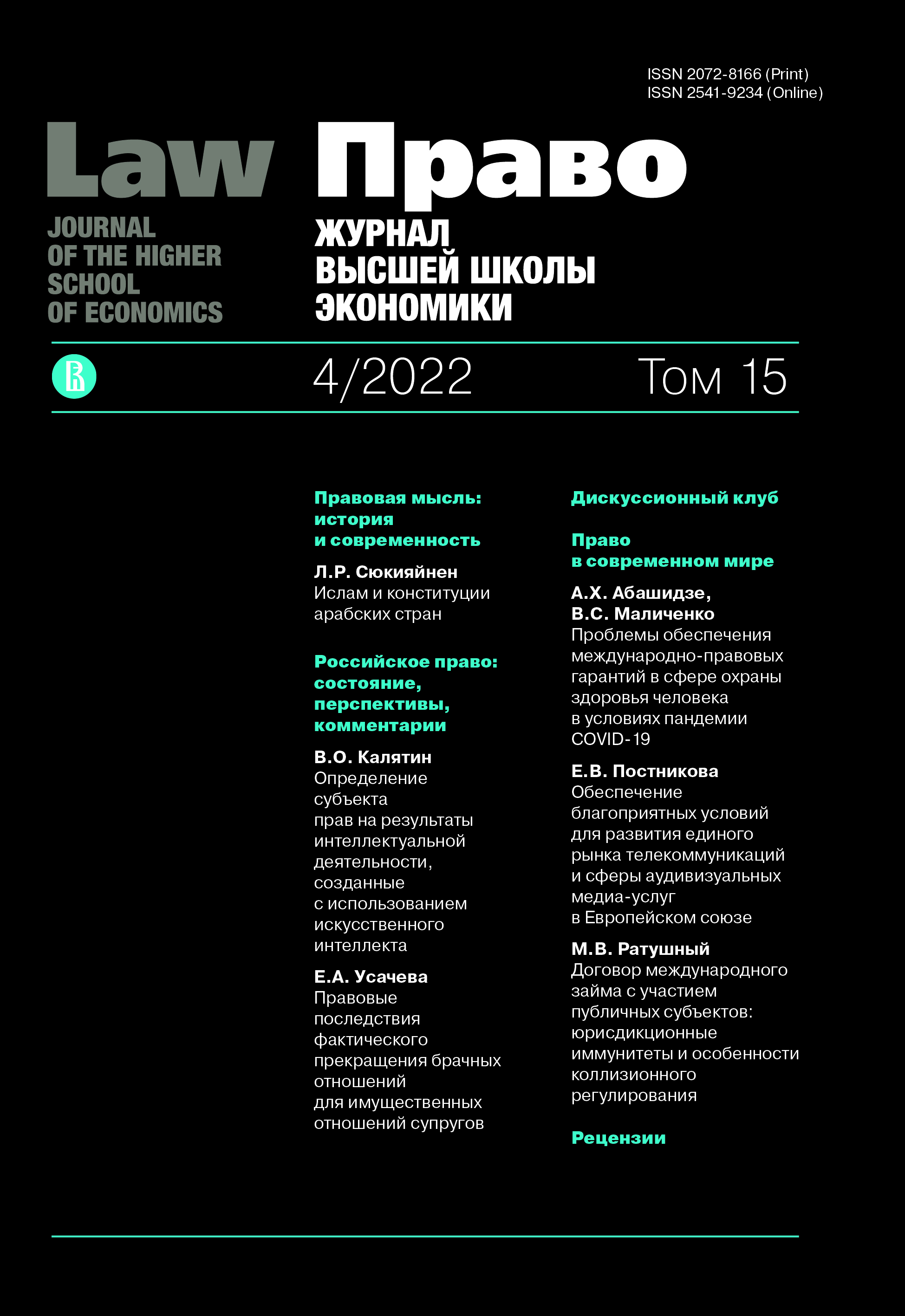Islam and Constitutions of Arab Countries
Abstract
Islamic norms, principles and institutions are influencing very visibly upon constitutions of all Arabic countries excluding Lebanon. The article deals with main forms and directions of such influence. In particular Islam has an effect on defining the character of the state, pillars of power, society and legal system. Constitutions of some Arabic states name them as Islamic. At the same time, they underline the Islamic adherence of the given state, people or nation. Constitutions of almost all Arab countries provide for the status of Islam as state religion. Constitutions of majority of Arab countries define the role of Sharia as principal source of legislation. At the same time, Islamic norms are involved into the constitutional regulation of human rights and freedoms. It covers for example freedom of conscience is limited in some countries by Islamic rules. Such provisions are included in the notion of public order is normally fixed in some Arab countries. Islam and Sharia directly affect constitutional norms about legal status of women, family, education, freedom of speech and views, mass media activity and scientific creation as well as freedom of associations. Among human obligations constitutions of some Arab states mention defence of religion. Some constitutions provide that all human rights must be interpreted within Sharia limits. Regulation of organisation of state organs and their functioning is also influenced by Islamic fundamentals. Among them there are consultation, equality and justice are considered to be pillars of Islamic power. Islamic norms effect upon the status of a head of the state who is to be a Muslim in these countries. In a few countries the supreme legislative body is called «consultative council». Sometimes a strict observation of Islamic cult rules is included in conditions of candidate for seat of parliament member is to meet. Constitutions of some countries provide for establishment of special state and other institutions linked directly with Islam and Sharia. Among those units there are Al-Azhar complex in Egypt, Supreme Islamic council in Algeria or Supreme council for appeals and fetwas in Mauritania. The constitutional status of Islam and Sharia in Saudi Arabia has some specific features. In this country Quran and Sunna of the Prophet Muhammad are declared to be the constitution of the Kingdom. These two sources are considered to occupy the place beyond all legal normative acts of the country.
References
Ahmed D., Ginsburg T. (2014) Constitutional Islamization and human rights: surprising origin and spread of Islamic supremacy in constitutions. Virginia Journal of International Law, no. 3, pp. 615-695.
Ahmed D., Gouda M. (2015) Measuring constitutional Islamization: Islamic constitutions index. Hastings International and Comparative Law Review, no. 1, pp. 1-74.
Al-Hajaya N. (2020) The public order based on marriage in Dubai Court of Cassation's jurisdiction regarding personal status matters: a study in UAE private international law. Al-Hukuk Journal, no. 1, pp. 401-429 (in Arabic)
Al-Nabhan M. (1986) The Islamic view at the legislative role of the state. Arab Law Quarterly, no. 5, pp. 557-561. DOI: https://doi.org/10.2307/3381398
Ballantyne W. (1986) The new Civil Code of United Arab Emirates: a further reassertion of the Shari'a. Arab Law Quarterly, no. 3, pp. 245-264. DOI: https://doi.org/10.1163/157302585X00482
Brown N., Revkin M. (2018) Islamic law and constitutions. In: Oxford Handbook of Islamic Law. A. Emon, A. Rumee (eds.). Oxford: OUP, pp. 779-818.
Chirkin V. Ye. (2014) Egiptian Constitution of 2014. Gosudarstvo i pravo=State and Law, no. 6, pp. 90-97 (in Russ.)
Hanson M. (1987) The influence of French law on legal development of Saudi Arabia. Arab Law Quarterly, no. 3, pp. 272-291. DOI: https://doi.org/10.1163/157302587X00318
Hosen N. (2004) In search of Islamic constitutionalism. The American Journal of Islamic Social Sciences, no. 2, pp. 1-24. DOI: https://doi.org/10.35632/ajiss.v21i2.501
Jabbur J. (1976) Arabism and other manifestations of adherence in the modern constitutions of Arab countries. Damascus: Ministry of Culture, 142 p. (in Arabic)
Johansen B. (2004) The relationship between the Constitution, the Sharî'a and the Fiqh: jurisprudence of Egypt's Supreme Constitutional Court. ZaöRV 64, pp. 881-896.
Khayrullin T., Korotayev A. (2017) Islam and Yemeni constitutions: comparative analysis. Aziya i Afrika segodn'ya=Asia and Africa Today, no. 5, pp. 43-48 (in Russ.)
Lombardi C. (2013a) Constitutional provisions making sharia “a” or “the” chief source of legislation: where did they come from? What do they mean? Do they matter? The American University International Law Review, no. 3, pp. 733-774.
Lombardi C. (2013b) Designing Islamic constitutions: past trends and options for a democratic future. International Journal of Constitutional Law, no. 3, pp. 615-645. DOI: https://doi.org/10.1093/icon/mot038
Sapronova M.A. (2011) Islam and state structures of Arab states: a guide. Moscow: MGIMO Press, 164 p. (in Russ.)
Vasil'yev A.M., Vinnitskiy D.I. (2013) Egyptian Constitution: Islamic «Yes» to secular «No». Aziya i Afrika segodn'ya=Asia and Africa Today, no. 3, pp. 2-10 (in Russ.)
Copyright (c) 2022 Law Journal of the Higher School of Economics

This work is licensed under a Creative Commons Attribution-ShareAlike 4.0 International License.


















